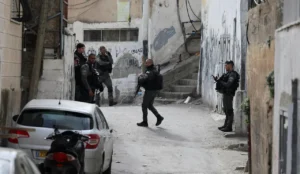Collective Punishments on Palestinians Won’t Help Israel’s War on Terror
 Amos Harel writes in Haaretz
Amos Harel writes in Haaretz There have been three copycat attacks since seven Israelis were murdered in a terror attack in Jerusalem’s Neveh Yaakov neighborhood Friday night. Assailants acted similarly, though less lethally, in Jerusalem’s City of David, the Jordan Valley’s Almog Junction and the West Bank settlement of Kedumim.
In Jerusalem, the perpetrator was a 13-year-old boy who, despite the swift, effective response of an officer on leave, shot and wounded the officer and his father. In the Jordan Valley, the assailant fled when his gun jammed after firing one bullet. In Kedumim, a Palestinian with a pellet gun that fires plastic spheres was shot by civilian security guards while trying to infiltrate the settlement.
The first two copycats used guns. Over the last year, Israel has seized hundreds of guns smuggled across the Jordanian, Lebanese and Egyptian borders, but many smuggling attempts presumably succeed. The West Bank and Arab towns in Israel are flooded with guns.
This is the main difference between the current wave of terror, which began in March 2022, and the previous one in 2015-16. The latter mainly involved stabbings and car-ramming attacks, and sometimes improvised guns. Today, even a 13-year-old boy can obtain a gun.

The fact that this time, too, the attacks are mainly being committed by so-called lone wolves – people who are not affiliated with any terrorist organization – makes it harder to identify them in advance and increases Israelis’ frustration. But alongside the usual anger and fear, one other thing stands out. The parties in the new government reaped political capital by assailing the previous government for what they termed its failure to stop terrorism. Now, it’s clear that they also have no real solutions or operational plans to halt the attacks.
Moreover, while Prime Minister Benjamin Netanyahu is accustomed to promising a vigorous war on terror and then making do with more restrained measures, that is not acceptable to some of his current coalition partners. National Security Minister Itamar Ben-Gvir lost his temper since being summoned from his Shabbat dinner to the scene of a terror attack where, for the first time, he bears real responsibility. Finance Minister Bezalel Smotrich is more calculated, but he has his own military and settlement agendas that don’t necessarily match Netanyahu’s.

Army and Shin Bet security service officers who attended Saturday night’s security cabinet meeting still adhere to the doctrines that guided successive Israeli governments after similar incidents. As in 2015, they proposed deploying additional forces in the West Bank and Jerusalem, bolstering intelligence, arresting more suspects and waiting patiently for these steps to bring results.
They opposed collective punishment and other showy measures, arguing that Israel must seek to lower the flames, not raise them. But that isn’t what some ministers wanted to hear.
Of the resolutions the security cabinet adopted, some will presumably evaporate, as has happened in the past; others aren’t expected to contribute much to the war on terror. As usual, Israel has fixated on demolishing or sealing the homes of the assailants’ families, but this practice has been very controversial for decades, and it’s still not clear whether it does more to deter the perpetrators’ relatives and neighbors than it does to fuel their desire for vengeance.

Netanyahu boasted on Twitter Sunday of his decision to immediately seal the 13-year-old terrorist’s home. But this step is usually taken only when Israelis are murdered, and in this case, the two wounded men are actually improving.
At the security cabinet meeting, it was clear that Netanyahu and Defense Minister Yoav Gallant had formed an alliance. They were backed by a man dubbed an observer at the meeting – MK Arye Dery, the Shas party chair. Within the room, those with experience of previous terror waves weren’t eager to talk tough.
But the new government has ushered in new voices – and not only that of Ben-Gvir, whose public appearances and social media messages are no different from his outbursts in the opposition. What Smotrich is saying, with complete self-control, is no less dangerous in the long run.
Smotrich wants to seize this opportunity to expand settlements, and he consistently advocates weakening the PA until it collapses. He doesn’t seem too worried by the defense establishment’s warnings that the PA’s collapse could lead to a third intifada and force Israel to take responsibility for West Bank cities.
It’s worth paying heed to another development that apparently worries Netanyahu and was mentioned in the security briefing for the ministers. Over the last two days, he has urged Israelis not to take the law into their own hands.
Since the attack in Neveh Yaakov, there have been dozens of incidents in the West Bank. Many involved settlers leaving their settlements to stone Palestinian cars on the highways. There have also been at least two arson attacks – Palestinian vehicles and homes were torched in the villages of Aqraba and Turmus Ayya.
The West Bank is once again becoming the Wild West. And that increases the chances that the Israeli-Palestinian cycle of revenge will just keep growing.
